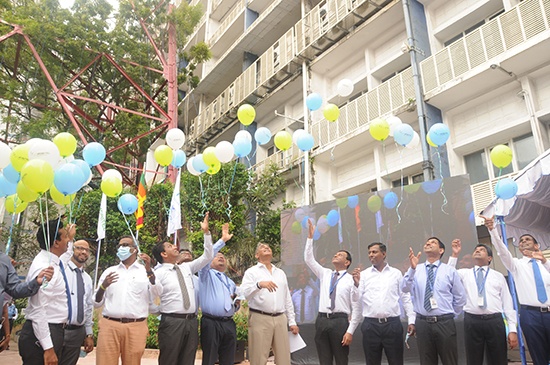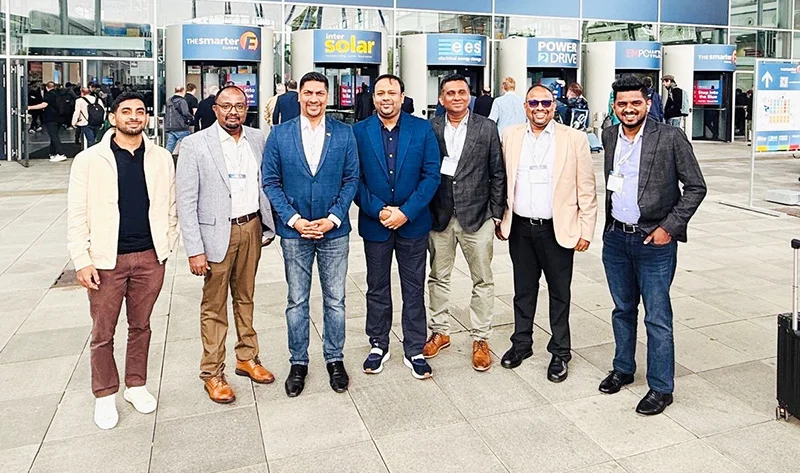Business
Brand unification makes history in national connectivity

Sri Lanka Telecom and Mobitel Join Forces
Sri Lanka Telecom (SLT) and SLT Mobitel unveiled their unified brand identity on Friday (January 1) at SLT Headquarters forming a formidable force creating a lasting legacy as the national Information and Communications Technology (ICT) solutions leader.
The historic unification of products and services were symbolically launched at the event that took place with the participation of Rohan Fernando, Chairman, Sri Lanka Telecom Group, Lalith Seneviratne, Group Chief Executive Officer, Sri Lanka Telecom, Kiththi Perera, Chief Executive Officer, Sri Lanka Telecom, Chandika Vitharana, Acting CEO, SLT Mobitel and other key officials of the Sri Lanka Telecom Group.
This historic unification will be an impetus to the Government’s effort to create a technology driven economy and a technology-based society, with SLT-MOBITEL contributing immensely towards the digitalization of Sri Lanka.
For over 163 years Sri Lanka Telecom PLC has solved the country’s need for connectivity, operating on Fixed, Mobile and Other operational segments, with SLT recognized as the fixed line powerhouse brand and Mobitel the benchmark for mobile services. Together, SLT and Mobitel strengthen the country’s ICT infrastructure, empowering people and transforming businesses with digitalisation.
“Today’s brand unification brings Sri Lanka Telecom and Mobitel products and services under a single brand.
The new brand identity will strengthen the brand equity of SLT-MOBITEL, synergizing the goodwill gained by both to one strong brand with digitalization at its core. A brand that consumers readily recognize, trust and accept.” Rohan Fernando, Chairman, Sri Lanka Telecom Group stated.
The new brand identity brings the brands together in a setting that is instantly recognizable to the consumer and portrays the unified relationship. The change in the logo is underpinned by a companywide realignment and unification of service, truly representative of SLT. SLT-MOBITEL enables the fulfilment of customer aspirations, be it in life or in work, making for greater efficiency, ease and limitless opportunities.
Lalith Seneviratne, Group Chief Executive Officer, Sri Lanka Telecom spoke on the impact of the brand unification on consumers. “At SLT Group we no longer think of ourselves as a connectivity partner but as a lifestyle company impacting people’s lifestyles greatly. The two anchor companies in the group, SLT and Mobitel hold an important position to support the foundation of the Group. Together with other subsidiaries they provide Fixed-Line Services, Mobile Communications, Broadband Service, Internet TV, and Health Services Access among others. The companies will now further enhance collaboration under one brand and provide customer-first innovative services as the industry leader in providing a great customer experience.”
Through Sri Lanka Telecom, SLT-MOBITEL provides telecom networks and ICT services to organisations of all proportions across all economic sectors, other telecommunications operators and internet service providers (ISPs), public sector institutions, and domestic customers. These efforts are supplemented by an array of technologies including optical fibre, ADSL2+, VDSL2, carrier-grade Wi-Fi, and both fixed and mobile 4G LTE technologies. The Company also uses its multiple international submarine cable networks to offer state-of-the-art global services, securing its position as a key global player in the telecom industry.
“From today, all of our customers will know us as one SLT-MOBITEL family and will enjoy all of our services together. All of us at SLT will be bound together under our common brand identity as we take helm as the primary telecommunication services provider to the nation. We look forward to the synergized brand value this gives us, as we work with Mobitel to expand our 4G, 5G and wireless broadband offering under a unified brand umbrella, creating value for the customers and the company.” Kiththi Perera, Chief Executive Officer, Sri Lanka Telecom said, speaking on the launch of the new digital-centric identity.
Mobitel has innovated market breakthrough products such as Master and
Chandika Vitharana, Acting Chief Executive Officer, SLT Mobitel commented on the synergy from the brand unification. “SLT Mobitel is the only truly Sri Lankan mobile services provider and is the frontrunner in digital mobile technology. SLT and Mobitel joining forces signals to the consumers the strength of our offering and our undisputed leadership in telecommunication services in Sri Lanka. The future for our customers looks bright, as our connection brings us all together.”
Sri Lanka Telecom PLC is the national Information and Communications Technology (ICT) solutions provider and the leading broadband and backbone infrastructure services provider in Sri Lanka for over 163 years.
Business
World Bank may convert infrastructure loans into tradable assets

A game-changer for Sri Lanka’s capital market
As the global community convened for the World Bank Group’s 2025 Spring Meetings under the timely theme “Jobs: The Path to Prosperity,” one message stood out: prosperity in the developing world depends not only on physical infrastructure but also on strong financial systems.
Among the influential voices at this year’s gathering was Douglas L. Peterson, Special Advisor to S&P Global and a longstanding advocate of resilient market economies.
Drawing from a decade-long tenure as CEO of S&P Global, Peterson delivered key insights that resonate deeply with the challenges and opportunities facing emerging economies such as Sri Lanka.
Peterson stressed that while global capital is abundant, it doesn’t move indiscriminately. “It follows signals, namely, data, transparency, regulatory certainty, labour and market stability.”
“When investors look to deploy capital in developing markets, they’re seeking a solid financial infrastructure,” Peterson said. “That includes reliable data, transparent pricing mechanisms, independent credit rating agencies, and clearly defined bankruptcy laws.”
These factors may not make headlines, but Peterson underscored their essential role.
“Financial infrastructure enables confidence, and confidence attracts investment,” he said.
A key initiative Peterson is championing in collaboration with the World Bank is titled ‘Originate to Distribute’, a structured finance approach where loans are created by institutions like the World Bank but sold to private investors.
Traditionally, loans from development banks remain on their balance sheets for decades. This initiative proposes standardising and structuring such loans so that private investors can purchase, pool, and trade them – essentially converting infrastructure loans into a new, tradable asset class.
“This is about creating velocity and scale,” Peterson said. “If the World Bank can originate loans and distribute them to the private sector, every dollar stretches further. It helps close the multi-trillion-dollar infrastructure investment gap.”
For countries like Sri Lanka, where public finances are under pressure, such a model could unlock significant private capital provided the regulatory environment and financial infrastructure are prepared to support it.
In alignment with the World Bank’s focus on job creation, Peterson prioritised five sectors he believes are pivotal for employment growth in developing nations: infrastructure (both physical and digital), agri-business, healthcare, tourism, and manufacturing. The common thread across all these sectors, he asserted, is infrastructure.
“Build an airport and you get hotels, transport services and even carbon savings,” Peterson said. “A bridge not only connects communities but also cuts costs, travel time, and emissions.”
According to Peterson, infrastructure investment yields a multiplier effect, often generating an additional $1.40 to $1.60 for every dollar spent. It also catalyses other industries. Manufacturing depends on roads and ports; tourism needs transport and energy; agriculture requires logistics and storage; and healthcare relies on reliable access and communication systems.
Peterson’s reflections also touched on a more structural issue that Sri Lanka is currently facing; the need to develop robust domestic capital markets. He emphasised moving beyond a banking-dominated financial system toward one that includes institutional investors like insurance companies and pension funds.
“These institutions become long-term investors,” he noted. “They form the foundation for sustainable infrastructure investment. Homegrown capital reduces reliance on external debt and increases financial resilience.”
Peterson’s remarks serve as a timely reminder as job creation and long-term prosperity in Sri Lanka will not come through piecemeal efforts. Instead, they require coordinated investments in both physical and financial infrastructure, from better roads and ports to regulatory frameworks that inspire investor confidence.
Unlocking private capital through trust, transparency, and smart financial engineering is the way forward. And as leaders like Peterson have shown, the tools and models already exist. It is now up to policymakers and financial leaders in Sri Lanka to ensure Sri Lanka is ready to embrace them.
Douglas L. Peterson currently serves on the board of the UN Global Compact and was formerly CEO of S&P Global, where he expanded the company’s market capitalisation from $16 billion to over $150 billion. He also led the G7 task force on sustainable finance in 2021.
By Sanath Nanayakkare
Business
AHK Sri Lanka facilitates business delegation to Intersolar Europe 2025

The Delegation of German Industry and Commerce in Sri Lanka (AHK Sri Lanka) successfully organized a visitor delegation to Intersolar Europe 2025, held from 7 – 9 May in Munich, Germany. Recognized globally as one of the most significant and comprehensive trade fairs dedicated to the solar industry, Intersolar serves as a premier platform for showcasing the latest innovations in renewable energy and sustainable technologies.
The Sri Lankan delegation comprised senior representatives from prominent companies in the sector, including Mega Solar, Micro PC Systems, Eco Solar Rays, and Puwakaramba Building Solutions, reflecting the country’s growing commitment to advancing renewable energy solutions.
The primary objective of this visit was to provide Sri Lankan companies direct access to the latest developments in solar technology, including sustainable energy solutions, energy storage systems, e-mobility, floating solar applications, agrivoltaics and recycling solutions. By connecting local enterprises with cutting-edge technologies and global industry leaders, AHK Sri Lanka aims to facilitate the adoption of modern energy solutions in Sri Lanka and support the nation’s broader transition to a more sustainable and energy-secure future.
A key highlight of the delegation’s agenda was a strategic meeting with the organizers of Intersolar Europe. This engagement provided valuable insights into the exhibition’s future vision and fostered discussions on potential collaboration opportunities between German and Sri Lankan stakeholders in the renewable energy sector.
Further amplifying the value of the delegation, AHK Sri Lanka coordinated over 25 tailored B2B meetings between Sri Lankan companies and German/European industry counterparts. These curated matchmaking sessions enabled participants to explore commercial opportunities, initiate technical partnerships, and lay the groundwork for future investments and joint ventures.
Business
Prime Group appoints Umaria Sinhawansa as Global Brand Ambassador

Prime Group, Sri Lanka’s leading real estate brand with a 30-year legacy and international branches in Australia and Dubai, has named celebrated Sri Lankan music icon Umaria Sinhawansa as its Global Brand Ambassador. This partnership unites two Sri Lankan powerhouses to showcase local talent and excellence worldwide.
The collaboration aims to strengthen Prime Group’s global expansion while promoting Sri Lankan culture. Umaria, who bought her first property from Prime Group a decade ago, expressed pride in representing the brand. Prime Group’s Co-Chairperson, Sandamini Perera, highlighted Umaria’s embodiment of Sri Lankan heritage and global appeal, aligning with their mission to elevate the country’s real estate innovation.
Together, they aim to inspire trust, connect with international markets, and celebrate Sri Lanka’s cultural richness on a global scale.
-

 Features5 days ago
Features5 days agoSAITM Graduates Overcome Adversity, Excel Despite Challenges
-

 News5 days ago
News5 days agoDestined to be pope:Brother says Leo XIV always wanted to be a priest
-

 Sports5 days ago
Sports5 days agoASBC Asian U22 and Youth Boxing Championships from Monday
-

 Opinion5 days ago
Opinion5 days agoDrs. Navaratnam’s consultation fee three rupees NOT Rs. 300
-

 Foreign News6 days ago
Foreign News6 days agoMexico sues Google over ‘Gulf of America’ name change
-

 Features4 days ago
Features4 days agoChampioning Geckos, Conservation, and Cross-Disciplinary Research in Sri Lanka
-

 Business5 days ago
Business5 days agoDilmah – HSBC future writers festival attracts 150+ entries
-

 Business5 days ago
Business5 days agoBloom Hills Holdings wins Gold for Edexcel and Cambridge Education












